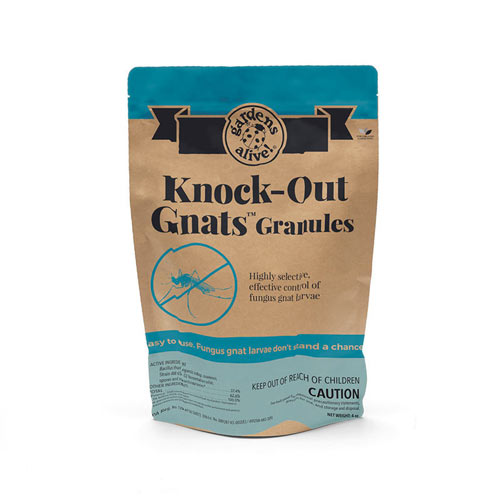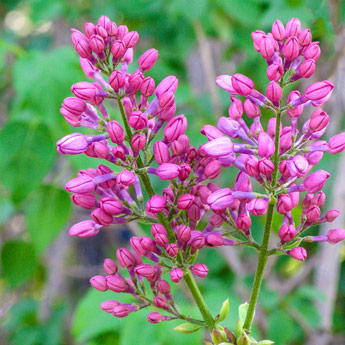Sulfur: It's not just for Chiggers Anymore!
-
Helpful Products from Gardens Alive!
-
 Knock-Out Gnats™ Granules - Control Fungus Gnat Larvae
Knock-Out Gnats™ Granules - Control Fungus Gnat Larvae
What's your most perplexing personal parasitical pest problem?
For me, it's the painful chomp of a deerfly deciding to dine on the back of my head when I'm working outdoors. (They target the back of your head, so wear a baseball cap whose back side is covered with sticky tape to trap them when they land; then you can count the number of bites you avoided when you go inside and take it off.)
How about the sizable chunk of meat a horsefly bite removes? (Saturate yourself with a botanical insect repellent whose active ingredients are herbs like lemon eucalyptus, lemon thyme, lemon balm and catnip; these natural aromatics have been shown to be just as effective as DEET in published medical studies.)
That nasty buzz you hear just as a female mosquito prepares to drain your personal blood bank? (Slather yourself as above. Treat standing water sources with BTI granules early in the season; added to water, this concentrated naturally occurring soil-dwelling organism prevents mosquito eggs from developing into full-grown flying bloodsuckers. Use an oscillating fan to keep you cool and bite-free while dining or snoozing outdoors.)
The terror of finding a tick on you? Or even worse, in you? (Wear permethrin-treated clothing whenever you work or hike outdoors.)
But if you live in the Midwest, the tiny mite known as the chigger is your most fearsome foe. I quote from the Missouri Department of Conservation's web site: "The worst thing about Missouri summers is chiggers".
In a New Yorker column by Calvin Trillin, the legendary humorist wrote:
"Chiggers, the microscopic itch machines whose prevalence on the Great Plains is the real reason so many Midwesterners have chosen to move to New York. A tourist from Joplin, Missouri, who is standing on the top of the Eiffel Tower and gazing down at Paris is not contemplating the beauty of the City of Lights; he is thinking, "even if they're over here, they couldn't get up this high."
I was reminded of the perils of chigger season by a recent edition of "The People's Pharmacy", a newspaper column, Podcast, Public Radio Show and newsletter written and produced by life-long pharmacists Joe and Theresa Gradeon, who skillfully discuss the risks and benefits of prescription medicines but also have a special fondness for time-tested home remedies, like sliding a bar of soap between the sheets to prevent nighttime leg cramps.
(Don't laugh: When I visited the South of France, a store that sold hand-made soaps devoted an entire wall to "bed sheet soaps".)
Back to chiggers. Although they are arachnids, like ticks and spiders, the pests that cause the most misery are larval forms that have only six legs and not eight. (Not that you can actually count those legs, as the itch-causing mites are too small to be seen with the naked eye.) However, you can often see the damage they leave behind in the form of little pin-head-size welts where they once fed. (And you now itch.)
They don't transmit disease, just intolerable itching; and unlike the other pests we mentioned, they're not blood suckers. Once they latch on to you, chiggers inject an enzyme that dissolves small areas of your epidermis; and that liquid is what they feed on.
They can be found almost anywhere, but the Midwest and Great Plains are chigger central. Although insect repellants, long pants tucked into your socks, and permethrin treated clothing can be effective at preventing their attachment, People's Pharmacy followers agree that dusting your socks and shoes with sulfur powder before venturing outdoors is the time-honored remedy, especially as chiggers tend to strike down low, just like fleas.
The 'sulfur in your socks' technique is especially useful for gardeners, as powdered sulfur is a multi-use commodity. Readily available at garden centers, sulfur is used to lower soil pH, as a plant disease preventer (dating back to the time of the Romans), as an insecticide (the Greek poet Homer mentioned "sulphur" nearly 2,800 years ago) and as a general soil amendment that can add vigor to deficient plantings when used in small amounts.
Somewhat like ticks, chiggers lie in wait in damp areas of brush. (They congregate in isolated 'islands' that host an abundance of the little nasties, while nearby areas may be almost chigger-free.)
Prevention: Stay away from damp overgrown areas; keep such areas well-mowed; or post "Warning: Chigger and tick nursery" signs to remind you not to enter your 'meadow'.
Purdue extension diagnostic entomologist Tim Gibb once noted that a lot of chigger bites happen when people 'wander off the beaten path' to pick raspberries, blackberries and wineberries, whose thickets are a favorite chigger habitat.
If you do so without the benefit of chigger protection, immediately go inside and take a shower to wash off any hitchhikers. (This is a good time to check yourself for ticks as well.) If you delay and they begin to siphon your fluids, take a warm bath with baking soda to reduce the itching. Applying cortisone cream or ointment to itchy sites should also help.
We close with a limerick attributed to entomologist H.B. Hungerford:
The thing called a chigger,
is really no bigger,
than the smaller end of a pin,
but the bump that it raises,
just itches like blazes,
and that's where the rub sets in.
For me, it's the painful chomp of a deerfly deciding to dine on the back of my head when I'm working outdoors. (They target the back of your head, so wear a baseball cap whose back side is covered with sticky tape to trap them when they land; then you can count the number of bites you avoided when you go inside and take it off.)
How about the sizable chunk of meat a horsefly bite removes? (Saturate yourself with a botanical insect repellent whose active ingredients are herbs like lemon eucalyptus, lemon thyme, lemon balm and catnip; these natural aromatics have been shown to be just as effective as DEET in published medical studies.)
That nasty buzz you hear just as a female mosquito prepares to drain your personal blood bank? (Slather yourself as above. Treat standing water sources with BTI granules early in the season; added to water, this concentrated naturally occurring soil-dwelling organism prevents mosquito eggs from developing into full-grown flying bloodsuckers. Use an oscillating fan to keep you cool and bite-free while dining or snoozing outdoors.)
The terror of finding a tick on you? Or even worse, in you? (Wear permethrin-treated clothing whenever you work or hike outdoors.)
But if you live in the Midwest, the tiny mite known as the chigger is your most fearsome foe. I quote from the Missouri Department of Conservation's web site: "The worst thing about Missouri summers is chiggers".
In a New Yorker column by Calvin Trillin, the legendary humorist wrote:
"Chiggers, the microscopic itch machines whose prevalence on the Great Plains is the real reason so many Midwesterners have chosen to move to New York. A tourist from Joplin, Missouri, who is standing on the top of the Eiffel Tower and gazing down at Paris is not contemplating the beauty of the City of Lights; he is thinking, "even if they're over here, they couldn't get up this high."
I was reminded of the perils of chigger season by a recent edition of "The People's Pharmacy", a newspaper column, Podcast, Public Radio Show and newsletter written and produced by life-long pharmacists Joe and Theresa Gradeon, who skillfully discuss the risks and benefits of prescription medicines but also have a special fondness for time-tested home remedies, like sliding a bar of soap between the sheets to prevent nighttime leg cramps.
(Don't laugh: When I visited the South of France, a store that sold hand-made soaps devoted an entire wall to "bed sheet soaps".)
Back to chiggers. Although they are arachnids, like ticks and spiders, the pests that cause the most misery are larval forms that have only six legs and not eight. (Not that you can actually count those legs, as the itch-causing mites are too small to be seen with the naked eye.) However, you can often see the damage they leave behind in the form of little pin-head-size welts where they once fed. (And you now itch.)
They don't transmit disease, just intolerable itching; and unlike the other pests we mentioned, they're not blood suckers. Once they latch on to you, chiggers inject an enzyme that dissolves small areas of your epidermis; and that liquid is what they feed on.
They can be found almost anywhere, but the Midwest and Great Plains are chigger central. Although insect repellants, long pants tucked into your socks, and permethrin treated clothing can be effective at preventing their attachment, People's Pharmacy followers agree that dusting your socks and shoes with sulfur powder before venturing outdoors is the time-honored remedy, especially as chiggers tend to strike down low, just like fleas.
The 'sulfur in your socks' technique is especially useful for gardeners, as powdered sulfur is a multi-use commodity. Readily available at garden centers, sulfur is used to lower soil pH, as a plant disease preventer (dating back to the time of the Romans), as an insecticide (the Greek poet Homer mentioned "sulphur" nearly 2,800 years ago) and as a general soil amendment that can add vigor to deficient plantings when used in small amounts.
Somewhat like ticks, chiggers lie in wait in damp areas of brush. (They congregate in isolated 'islands' that host an abundance of the little nasties, while nearby areas may be almost chigger-free.)
Prevention: Stay away from damp overgrown areas; keep such areas well-mowed; or post "Warning: Chigger and tick nursery" signs to remind you not to enter your 'meadow'.
Purdue extension diagnostic entomologist Tim Gibb once noted that a lot of chigger bites happen when people 'wander off the beaten path' to pick raspberries, blackberries and wineberries, whose thickets are a favorite chigger habitat.
If you do so without the benefit of chigger protection, immediately go inside and take a shower to wash off any hitchhikers. (This is a good time to check yourself for ticks as well.) If you delay and they begin to siphon your fluids, take a warm bath with baking soda to reduce the itching. Applying cortisone cream or ointment to itchy sites should also help.
We close with a limerick attributed to entomologist H.B. Hungerford:
The thing called a chigger,
is really no bigger,
than the smaller end of a pin,
but the bump that it raises,
just itches like blazes,
and that's where the rub sets in.
-
Helpful Products from Gardens Alive!
-
 Knock-Out Gnats™ Granules - Control Fungus Gnat Larvae
Knock-Out Gnats™ Granules - Control Fungus Gnat Larvae







 Gardens Alive! & Supplies
Gardens Alive! & Supplies




